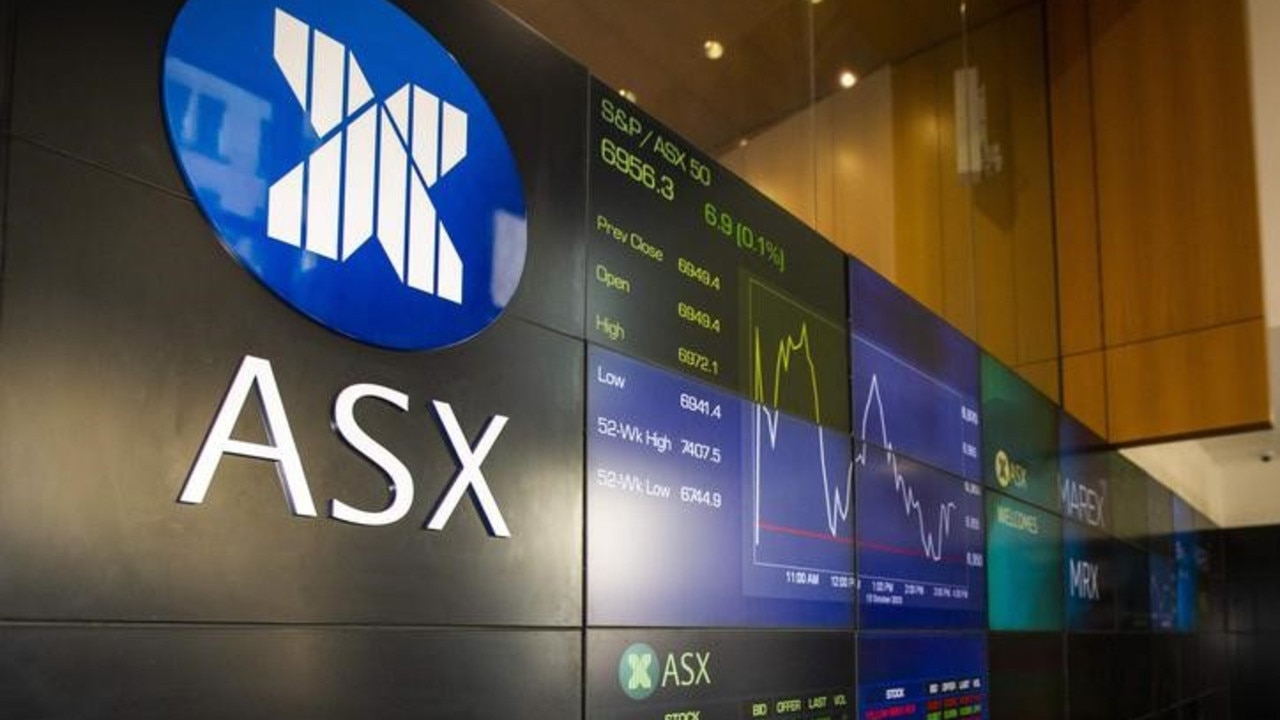Aussies speak of fear over the Greece debt crisis as the world braces for the worst
AS the Greece debt crisis hits breaking point, members of Australia’s Greek community are desperately doing all they can to help their loved ones.
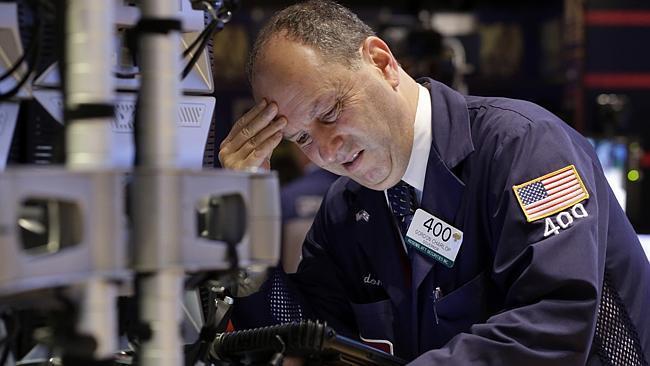
Economy
Don't miss out on the headlines from Economy. Followed categories will be added to My News.
AUSTRALIA’s Greek community are anxiously sending funds to their loved ones in Greece as the country’s debt crisis reaches breaking point.
AUSTRALIA’s Greek community are anxiously sending funds to their loved ones in Greece as the country’s debt crisis reaches breaking point.
Europe’s sharemarkets are preparing to reopen and world leaders have continued to plead with the Greeks to vote in favour of a referendum on their nation’s bailout.
But Greece’s possible exit from the eurozone now appears alarmingly imminent.
Athens has confirmed its coffers were empty and it would be unable to afford a €1.55 billion loan repayment to the International Monetary Fund by today’s deadline, which hits early tomorrow morning in Australia.
Amid the ongoing unrest, Melbourne’s Greek community have today voiced their fears of a financial crisis and families say they feel pressured to send money back home.
“It will have an impact on our very strong and large Greek community,” Acting Victorian Premier James Merlino warned.

MP Steve Dimopoulos said the community felt at a loss.
“There’s an enormous amount of funds that flow from the Greek communtiy here to relatives there,” Dimopoulos said.
“I think there’s just going to be more pressure for that to happen.”
An Australian Hellenic Initiative has been set up so locals can raise money for crisis relief to support poor families.
“They’re the kinds of things you do and you just hope that a country and a civilisation that’s had 5000 years of proud heritage actually sees through this pretty awful time and gets back on its feet,” Mr Dimopoulos said.
The Australian sharemarket showed it could not escape the volatility of global markets after shedding $40 billion yesterday before getting off to a weak start today at 10.15am following heavy losses in offshore trade.
The benchmark S&P/ASX200 index retreated 21.2 points while the all ordinaries index declined 23.1 points.
The sharemarket was trading in the red at noon after fluctuating throughout the morning.
CommSec market analyst said there was “still uncertainty” after yesterday’s “carnage on our market”.
Mounting concerns about Greece has driven down international markets after talks between the country and its creditors broke down, as thousands of anti-bailout protesters hit the streets.
US stocks fell sharply on Monday, while major indexes in Europe took even bigger losses.
Greece’s long-running debt crisis took a dangerous turn over the weekend after the country’s Prime Minister Alexis Tsipras defiantly rejected a last-ditch compromise deal from creditors and instead said his government would hold a referendum on July 5 on further austerity proposals made by the country’s lenders.
Tsiparas is urging his citzens to vote against the bailout package, which risks leading to a messy transition away from the euro currency and could cause global financial turmoil.
European officials refused to extend the country’s bailout program, which expires Tuesday, the same day it’s supposed to make a debt payment to the IMF.
European Commission chief, Jean-Claude Juncker, said he felt “betrayed” by the “egotism” shown by Greece in failed debt talks, according to the BBC.
He said Greek proposals were “delayed” or “deliberately altered” and the talks had been broken “unilaterally” after Mr Tsipras announced the referendum.
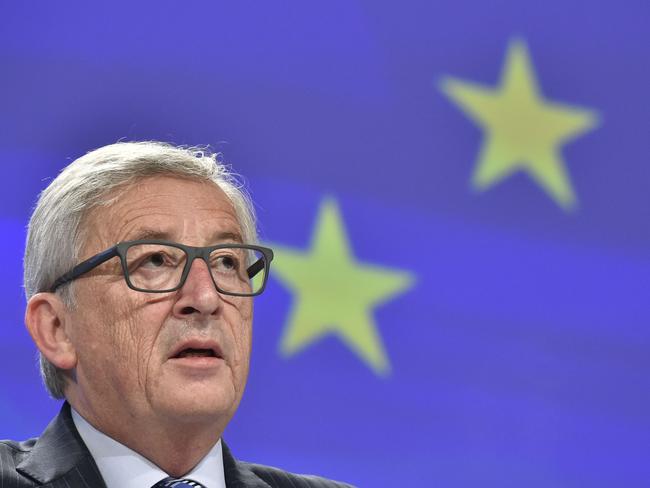
Anti-bailout demonstrators rally in Greece
Meanwhile, about 17,000 people have hit the streets of Athens and Thessaloniki to say ‘No’ to the latest offer of a bailout deal, accusing Greece’s international creditors of blackmail.
“Our lives do not belong to the creditors!” read banners held aloft by demonstrators on Monday, many of whom support the PM and said they would heed his call to vote against the latest deal in a referendum on Sunday.

This is despite the risks the country might then go crashing out of the eurozone.
“The people of Greece have made many sacrifices. What interests me is not the euro but guaranteeing a dignified way of life for the next generations,” 50-year-old Vanguelis Tseres, who has been unemployed since the start of the debt crisis in 2010, told AFP in Syntagma square in the capital.
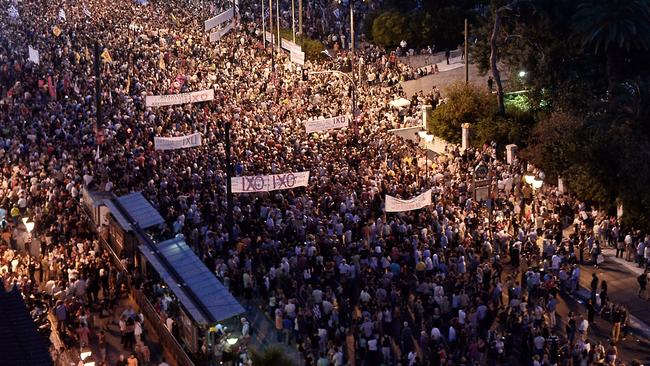
European leaders had earlier pleaded with Greek voters to back the hotly disputed bailout proposals or face leaving the euro.
Mr Juncker warned Greeks they “shouldn’t choose suicide just because you are afraid of death,” urging them to vote “Yes” as a “No” vote would be a no to Europe.
A demonstration in favour of the bailout deal is due to be held on Tuesday.
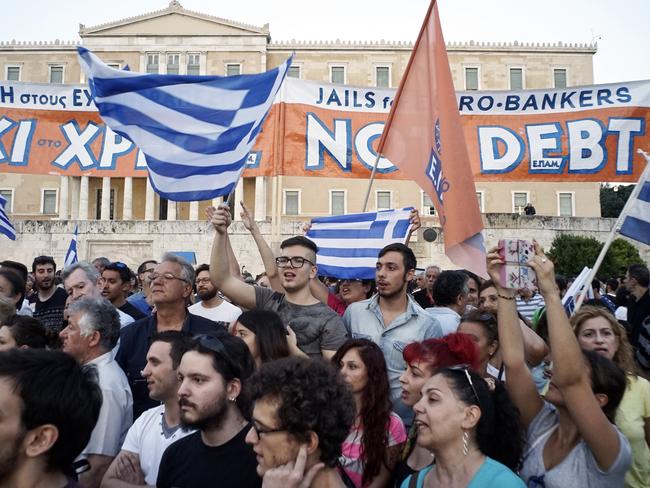

Global stocks slump as Greece’s debt crisis deepens
After the European Central Bank capped its emergency support for Greece’s banks, the Greek government to close banks and announce limits on withdrawals. Daily cash withdrawals are capped at 60 euros ($87) per account, sending crowds of nervous elderly depositors who do not have ATM cards rushing to closed bank branches.
“Whenever you see any kind of bank line, there is in the back of investors’ mind the thought: ‘What if it spreads? What if people panic?” said Karyn Cavanaugh, senior market strategist at Voya Investment Management. “What’s going on in Europe, of course it’s going to roil markets in the short term.”
But for US investors, she said, “the long-term impact is not that big of a deal.”

The Standard & Poor’s 500 index was down 33 points, or 1.6 per cent, to 2068 as of 2.19pm Eastern. The Dow Jones industrial average fell 266 points, or 1.5 per cent, to 17,679, and the Nasdaq composite fell 89 points, or 1.8 per cent, to 4990.
The losses were broad. Nine of the 10 industry sectors in the S&P 500 index slumped. The only one that rose was utilities, a traditional safety play.
In Europe, Germany’s DAX lost 3.6 per cent while France’s CAC-40 lost 3.7 per cent.
The FTSE 100 index of leading British shares fell 2 per cent. Greece’s stock market was closed.

Investors bought German and British government bonds, which are seen as safe havens, and sold bonds issued by Greece’s government, sending those yields sharply higher.
“The initial market reaction is negative,” said Dan Greenhaus, chief strategist at the brokerage BTIG, in a note to clients.
But Mr Greenhaus thinks that this episode in the European debt crisis isn’t as dangerous as previous ones. “We do not think this is Armageddon for the global economy,” he said.
The last time Greece’s troubles shook US markets, there were plenty of other problems.
In 2012, Spain had entered a recession, and the worry was that it was too big of a country to rescue. Sputtering US job growth added to the anxiety.
Originally published as Aussies speak of fear over the Greece debt crisis as the world braces for the worst


